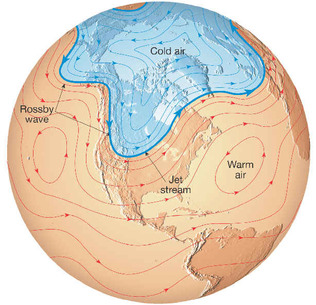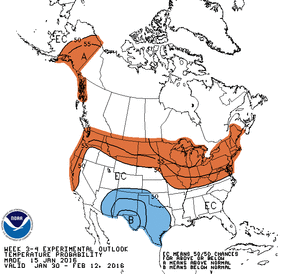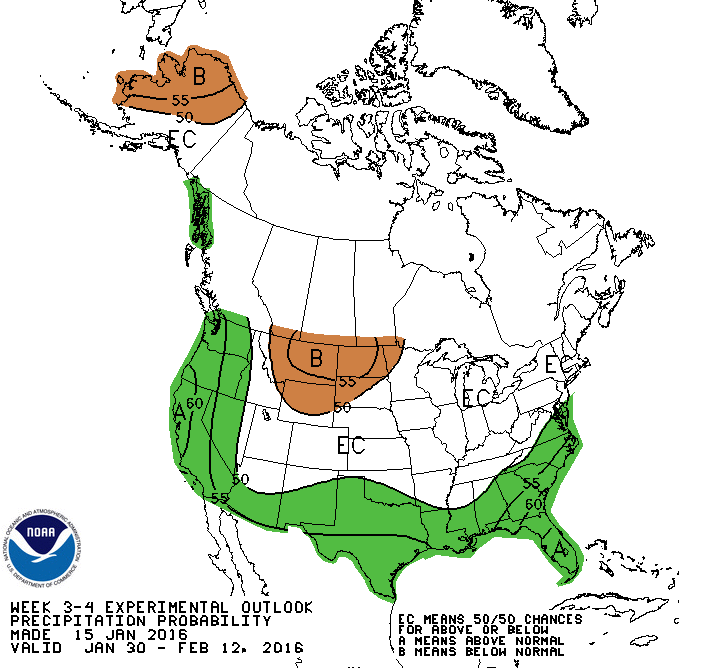 Waves (called Rossby waves) consist of ridges and troughs in the middle and upper levels of the atmosphere that usually rotate counter-clockwise across the Northern Hemisphere. Image credit: stephenleahy.net
Waves (called Rossby waves) consist of ridges and troughs in the middle and upper levels of the atmosphere that usually rotate counter-clockwise across the Northern Hemisphere. Image credit: stephenleahy.net I've already been seeing some forecasts for the Rolex 24 posted on social media. Some weather outlets have forecasts that go out over a month in advance - forecasting temperatures down to the degree, how much cloud cover there will be, and even whether rain will be light or heavy. I value my professional reputation too much to do such a thing. In my opinion, making a forecast that specific so far in advance is borderline irresponsible, and misrepresents the current limits of the science of meteorology. Depending on the weather pattern, computer models do not show a reasonable amount of predictive skill until 6 to 10 days in advance, and sometimes even less than that. As a general rule, I would not have any confidence in a specific weather forecast that goes beyond a week.
However, we can predict with some skill whether the weather pattern will favor temperatures or precipitation that are above or below climatology. Let me clarify a few things in that sentence.
By "weather pattern", I mean the pattern of ridges and troughs that circulate around the Northern Hemisphere in the middle and upper levels of the atmosphere. Think of the atmosphere as waves in the ocean - there are ridges and troughs, and these waves rotate around the earth. The troughs bring cold air southward, and the ridges bring warm air northward. Some troughs are "deeper" (reach farther southward) than others. These waves usually circulate counter-clockwise around the Northern Hemisphere. There are several large-scale signals (El Nino being one of them) in the atmosphere and the ocean that influence the frequency, speed, and amplitude of these waves, allowing meteorologists to make predictions about how the wave pattern will change. The troughs and ridges influence the weather you feel at the ground by transporting masses of cold or warm air, and dry or moist air. They also generate areas of rising air or sinking air.
By "climatology", I mean the weather than can typically be expected over a region of the globe at a certain time of the year, based on a 30-year average of temperature and precipitation (this average is also called "normal"). Based on climatology for Daytona Beach, Florida, a typical day in late January around the Rolex 24 weekend will have a high temperature of 69 degrees, a low temperature of 48 degrees, and about a 35% chance of rain. Here's a nice website that gives the climatology of Daytona Beach throughout the year.
If we can predict the pattern of waves across the Northern Hemisphere a few weeks in advance, then we can have some idea if the chances of rain are higher or lower than climatology, or if temperatures will be higher or lower than climatology. We can have a general idea of what might be expected for a region over a period of a few days in comparison to the 30-year average. However, we cannot skillfully predict what the temperature will be on a specific day in a specific location a month in advance.
The Climate Prediction Center is a branch of NOAA that issues these long term weather outlooks. They make weekly, monthly, and seasonal forecasts of how the weather will deviate from climatology. They predict if the temperature and precipitation is likely to be above or below normal, expressed as a "percent chance" that reflects their confidence. Sometimes the predicted wave pattern does not give a clear signal of whether temperatures or precipitation will be above or below normal. In this case, their forecast will be for "equal chances" of above or below normal.
Here's their latest outlook that covers the Rolex 24 weekend:
The image on the right shows that there is a 60% chance or greater that precipitation will be above normal.
Keep in mind that this forecast covers a period of two weeks, and the Rolex 24 weekend is only two days out of the 14 days that it covers. So those two days could be completely dry, but the other 12 days have rain, and the forecast of above normal rainfall would still be accurate.
That's the extent of what meteorologists can confidently tell about the weather this far out. If you see forecasts that tell you more detail than that two weeks away, take them with a grain of salt.
I'll have the full Rolex 24 forecast up a week before the race, on January 24.







